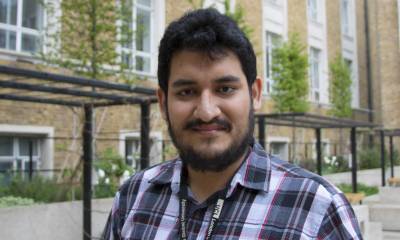Jose Leon-Rojas, MSc Advanced Neuroimaging

1. What is your educational background?
I graduated as a medical doctor in Quito, Ecuador in 2017. During my medical school studies I had two part-time positions: teaching assistant in anatomy and neuroanatomy at my medical school and medical tutor in neuroanatomy, neurology, emergency medicine and internal medicine for pre-med students from the U.S. and Canada. After my graduation I was offered a teaching position at my medical school for the subjects of anatomy and neuroanatomy for 1st year medical students.
2. What are your motivations for pursuing a graduate-level qualification?
I am passionate about the inner workings of the brain, specifically the study of its anatomy through novel methods such as neuroimaging which is a rapidly evolving and wildly interesting field of study. My main goal is to become a neurological surgeon and I believe that my MSc will help me in recognising common pathology and getting a better picture of the brain through imaging methods.
3. Why did you apply to UCL for graduate study?
I believe that UCL and the UCL Queen Square Institute of Neurology (IoN) are leading the charge for neuroscience and neurological research. UCL has key associations that I was really interested about e.g. The National Hospital for Neurology and Neurosurgery (NHNN). Additionally UCL is ranked within the World’s Best 10 Universities!
4. What is the best thing about your course?
The best thing is that the classes are small and teaching is really personal and tailored to each student. UCL encourages thinking outside the box and developing critical thinking regarding your lessons. There is a lot of opportunities for growth and developing additional skills!
5. What do you find interesting about your field of study and what inspires you?
I am passionate about how MRI creates an image that can have such powerful diagnostic accuracy depending on what types of information you can gather. For example you can even tract how water molecules move around the Central Nervous System and use this information to reconstruct in three dimensions the white matter tracts that connect one area of the brain with another and gives you vital functions such as speech, language, vision and movement.
6. What are your career plans once you’ve completed your current programme of study at UCL?
My future plan is to undertake a PhD at the IoN to study Image-Guided Epilepsy Surgery. UCL Careers were really helpful during my application process; I attended multiple talks including PhD application process, how to write a good cover letter, and what are PhD departments looking for in an applicant.
7. Do you think studying at UCL Faculty of Brain Sciences is a good investment?
I definitely think it is a good investment, not only because I am being taught by world-class experts but because there are literally hundreds of opportunities out there to meet people and improve your professional profile.
8. Have you undertaken any networking opportunities either as part of your degree or outside of your studies?
Yes, outside of my studies I have attended a couple of networking events about neuroscience such as free lectures and courses. I have met different people and managed to obtain a position in a research group at the NHNN regarding Brain Mapping Research.
9. What is it like studying in London and how do you think it has benefited your studies?
London is a global city and there are a lot of opportunities to improve yourself and it has definitely improved my way of study and thinking.
10. Has there been an element of your degree programme that has impressed you or been particularly valuable?
Hands-on learning. I have really enjoyed the workshops where we were able to access real patient images in a similar way to a neuroradiologist. I was also able to use the Mini-Terranova MRI machine so I could fully understand the Physical Principles behind MRI generation.
11. How do you think the system of learning/researching at UCL differs from that in your own country?
In my country, research is not given the importance that it deserves. It is actually one of the reasons I came here, to learn how to undertake research and take that back to my country to encourage its production!
 Close
Close

